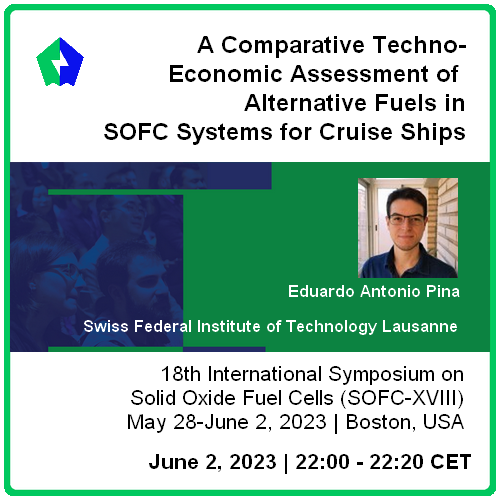Dr Eduardo Antonio Pina from the Swiss Federal Institute of Technology Lausanne, EPFL, will give a speech at the 18th International Symposium on Solid Oxide Fuel Cells (SOFC-XVIII) (May 28 – June 2, 2023) in Boston, USA.
The focus of the presentation, titled "A Comparative Techno-Economic Assessment of Alternative Fuels in SOFC Systems for Cruise Ships," on June 2, 2023 (22:00-22:20 CET/16:00-16:20 EDT) at Hynes Convention Center - Room 208 (Level Two), will be a techno-economic assessment of the genset for liquefied natural gas (LNG) and four identified potential alternative fuels (i.e., methanol, diesel, ammonia, and hydrogen) performed under the NAUTILUS project.
The study provides a systematic evaluation of the cost performance of SOFC systems consuming different fuels. The analysis is based on the SOFC module, which is composed of an SOFC stack and balance of plant (BoP) components. The SOFC stack has a nominal power production of 100 kWe achieved by combining several stacks of 10 kWe and produces hot water at 90 °C and saturated steam at 180 °C from waste heat recovery. BoP accounts for all pieces of equipment that are required to run the SOFC stack, such as blower, reformer, heat exchangers, after burner, and pumps. In addition, the implementation of cathode off-gas recirculation (COGR) is assessed as it could potentially improve waste heat recovery both in terms of quantity and quality.
Among the main criteria for comparing the genset running on different fuels are the total annual cost, composed of the annual investment cost and annual operation cost, and the Levelized Cost of Exergy (LCOEx). The latter is especially important because of the joint production of electricity and heat (saturated steam at 180 °C and hot water at 90 °C) that takes place in the genset. The necessary replacement of SOFC stacks, given the stack and system lifetimes, is taken into account in the annual investment cost. The annual operation cost consists of fuel consumption and maintenance costs.
The economic benefit of implementing COGR is verified for all fuels, especially for methanol, hydrogen, and diesel, which present LCOEx reductions of about 10%, 9%, and 6% respectively. Ammonia and methanol have the lowest LCOEx, about 0.260 EUR/kWh and 0.270 EUR/kWh, respectively, while hydrogen has the highest LCOEx, about 0.430 EUR/kWh. The sensitivity analysis suggests that fuel purchase price, stack lifetime, and annual interest rate are the parameters with the highest influence on the system cost. Overall, ammonia and methanol are the most promising fuels.
The results of this research will aid decision-makers, including shipyards and policymakers, in designing new energy systems with low emissions for maritime applications.
This project has received funding from the European Union’s Horizon 2020 research and innovation program under grant agreement No 861647.
Stay in touch with us!
#NAUTILUS_2020 #propulsionsystem #sustainableshipping #battery #fuelcell #cruiseships
***
⇒ Follow us on Twitter/LinkedIn to be on board.
Follow #NAUTILUS_2020
NAUTILUS is a short for Nautical Integrated Hybrid Energy System for Long-haul Cruise Ships.

This project has received funding from the European Union’s Horizon 2020 research and innovation program under grant agreement No 861647.

